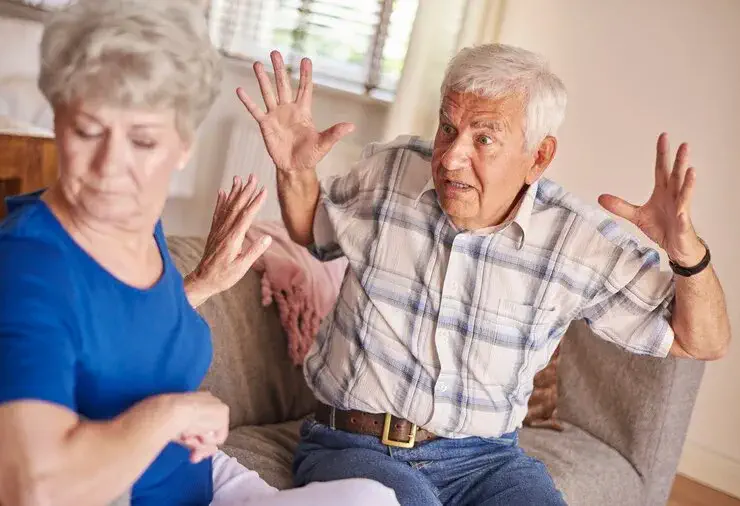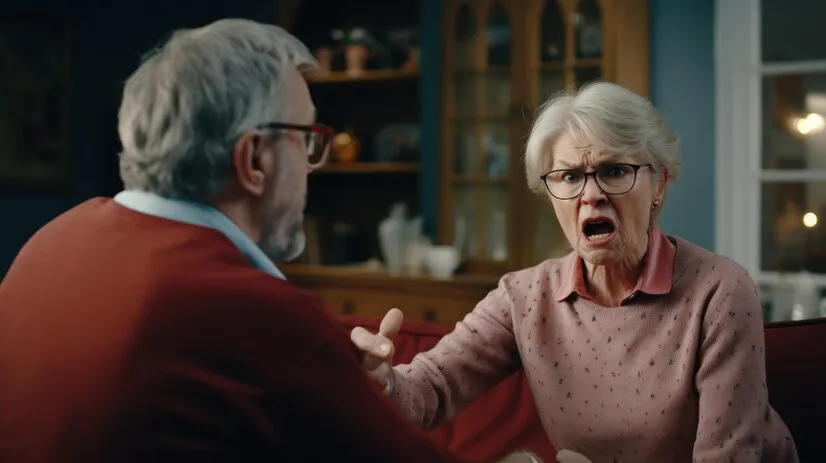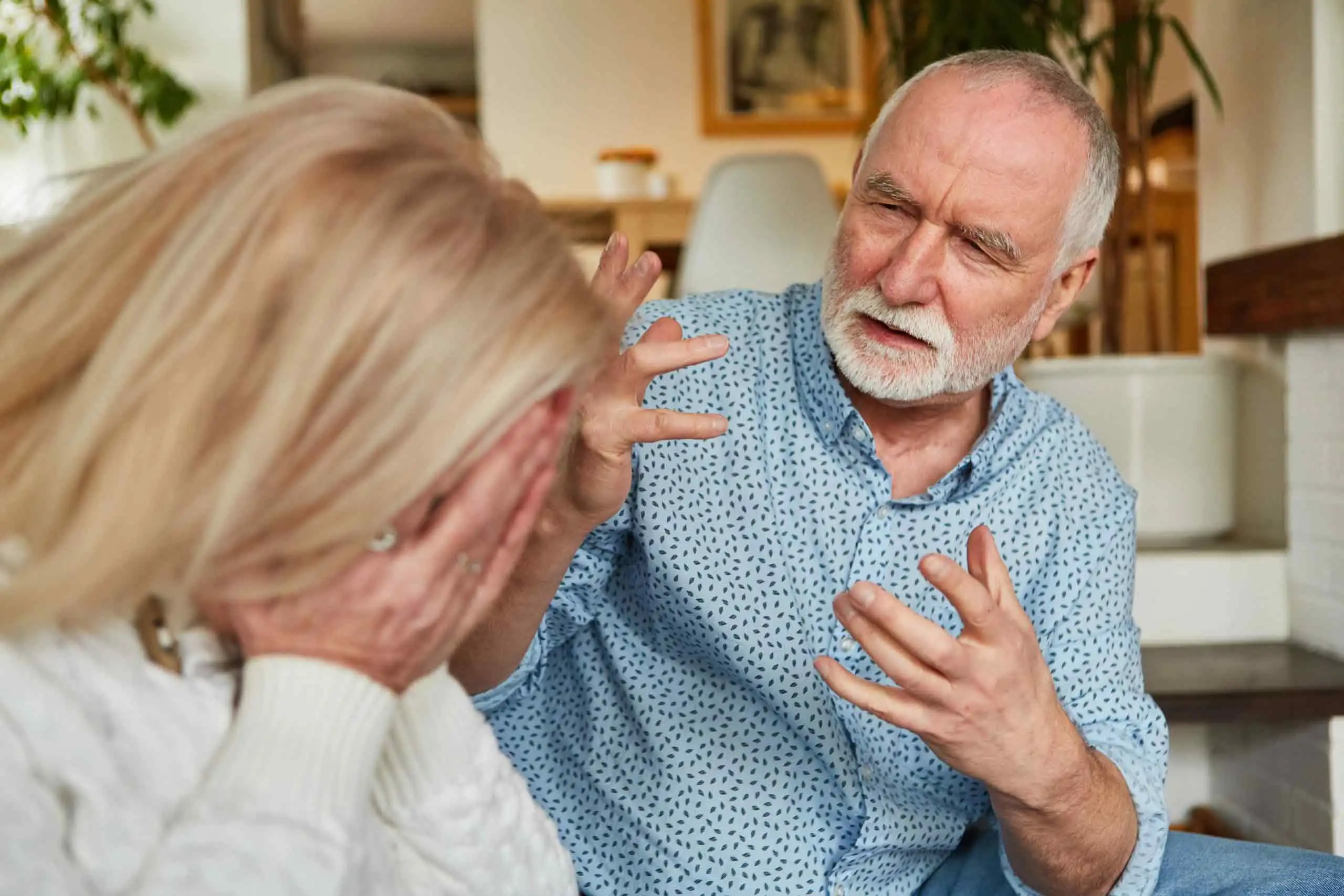
Causes of Anger in Elderly + How to Manage It
Anger is usually considered a natural emotion and is more common among people today. Anger in older adults means experiencing strong emotions such as sadness, anger, frustration, etc. Causes of anger in elderly are diverse and can occur for various reasons such as physical and health changes, isolation and loneliness in elderly, memory problems, financial stress, and environmental changes.
Anger management in older adults is very important, because it will definitely have many positive effects on their physical and mental health, better relationships, and increased quality of life. It often appears in various forms such as verbal aggression, physical aggression, and physical symptoms such as increased heart rate and excessive sweating, and sometimes muscle tension.
What causes anger in old age? What is the appropriate behavior with the elderly in case of aggression? In this article from the Human Health Mag website, we are going to explain the causes, consequences, and warning signs of anger in the elderly. We will also explain effective solutions and the role of family, caregivers, and elderly nurses in controlling this problem.
What Causes Anger in Older Adults?
Like other age groups, the elderly have various reasons for anger. Anger in the elderly can be due to their irritability and high sensitivity. Not being understood by those around them also causes feelings of anger in the elderly. Some neurological disorders such as dementia and Alzheimer’s cause these behaviors. In case of impaired short-term memory; the elderly forget that the elderly nurse has performed his duties and this causes the elderly to be upset.
Often times, restlessness and aggression in the elderly occurs for a specific reason. For example, ambiguous behavior of people around them leads to worry and bad mood in the elderly. The elderly expect those around them to behave as they want. If you encounter anger or aggression while caring for an elderly person, try to find out the cause. If you can understand the causes of anger in elderly, you can take appropriate steps to correct and treat these behaviors. Depending on the circumstances, an elderly person may experience anger for one or more of the following reasons:

Physiological Causes of Anger in Elderly
- Changes in hormone levels, such as decreased testosterone or changes in stress hormones
- Chronic diseases, such as diabetes, heart disease, and chronic pain
- Changes in nervous system function and decreased cognitive abilities
- Insomnia or sleep disorders in the elderly
- Structural and functional changes in the brain that occur with age
Psychological Causes of Anger in Elderly
- Psychological problems such as depression, hopelessness, feelings of helplessness, increased irritability, etc.
- Anxiety, stress and psychological pressures such as financial stress, family problems and environmental changes
- Feelings of loneliness and social isolation of seniors, loss of friends and family members and reduced social activities
Environmental Causes of Anger in Elderly
Environmental factors have an important role in the occurrence of irritability and anger in the elderly. Some of environmental factors in the occurrence of irritability and anger in seniors include:
- Changes in lifestyle and environment, such as moving to other environments such as nursing homes, etc.
- Changes in relationships with family members, such as losing a spouse and other loved ones or being away from children
- A sense of losing someone or something that is valuable to the senior (For example, a person may lose the ability to drive)
Sometimes not addressing the underlying problem in a senior only makes the aggression and anger worse. Try not to ignore these problems in a senior:
- Constipation
- Drug interactions
- Dirty underwear or diapers
- A sudden change in residence
- Insufficient rest or sleep
- Too much noise in a large, busy room
- Being pressured by others to do something (for example, to take a bath, or to remember personal events)
What Causes Extreme Anger in Older Adults?
If you’ve ever dealt with serious pain, such as that caused by a tooth infection, you know how hard it is to smile when you’re in pain. Older people often experience chronic pain, and trying to cope with it can take a toll on their patience. Older adults who have difficulty speaking may become angry if they have a specific discomfort that they can’t handle on their own.
- Communication Problems
Seniors experience communication challenges for a variety of reasons. A senior may not be able to find the right words to express their feelings, and may try to get others to understand by shouting. Seniors who are unable to speak at all may resort to throwing objects to communicate their problems. Encouraging the senior to take the time to express what they need can help with this problem. Reducing the noise level in the home can also encourage the senior to use a softer tone.
- Frustration
A change in a senior’s abilities can make it difficult to do simple tasks, such as putting on shoes or a shirt. The senior may become angry and anxious that they can no longer do things they used to do easily. In this situation, rushing and insisting that the senior be faster is not helpful. Try to include plenty of time in the senior’s daily schedule to do their daily tasks.
- Emotional health issues
Depression, anxiety, grief, and PTSD are all mental health disorders that can increase anger as a warning sign of mental health problems. The senior may need professional therapy to learn how to cope with their emotions. Some seniors need medication to relieve intense anger. A professional counselor can help the senior figure out what the root cause of their anger is and learn ways to treat it. So be sure to see a counselor when you see depression, grief, and symptoms of anxiety in the senior.

- Inadequate rest
Like everyone else, seniors are more prone to becoming irritable when they are tired. Fatigue is common in older age, and the elderly may react to disrupted sleep patterns. Giving the elderly a chance to spend quiet time or sleep during the day can keep the elderly’s emotions more balanced.
- Dementia or stroke
Brain injuries are often associated with personality changes. If the elderly person has had a stroke or has been diagnosed with dementia, it is important to consult with a doctor about how to treat their symptoms. Ensuring that the elderly person completes their treatment and takes their prescribed medications on time can help them maintain a calmer personality.
The disabled elderly were once young and used to do their work alone. So don’t show your disability by whining and complaining. Even some of the stubbornness of seniors is due to a specific reason, for example:
Aggression and Anger in Elderly During Bathing
Reasons: shame and need for privacy, not caring about help, uncomfortable washing (water too cold or fear of water), previous bad experience, fear of slipping in the bathroom, dementia and forgetfulness of the need for general hygiene.
Correct behavior: Ask the adult to explain the source of his/her fear or arousal. Is he/she afraid of slipping? Is the water too hot or cold? Does he/she forget to take a shower? In this case, it can be safer to check the bathroom and its heat and coldness, you can also use a bath chair. Maintain privacy as much as possible. It is better not to treat your elderly parent like a child.
Aggression and Anger in Elderly During Using a Cane
Reason: Elderly people often feel helpless when using a cane.
Correct behavior: Ask for help from his/her friends and peers. This is helpful at any age! Try to make him/her understand that using a cane is more useful for him/her than he thinks. Watching movies about the elderly also helps a lot. Remind him/her that using a cane makes it easier for him/her to do things and walk. Canes also reduce the likelihood of slipping and falling and causing serious injuries.
Aggression and Anger in Elderly During Using a Cane
Reasons: Apathy, depression, dementia
Correct behavior: Ask the elderly what their problem is? Clothes or allergies? Does he/she wash and wear his/her favorite clothes regularly? When he/she goes to the bathroom, quickly put dirty clothes in the washing machine and wash them. If he/she likes a certain type of clothing, buy more of that type of clothing. Be aware that wearing similar clothes is a suspicious sign of Alzheimer’s disease, memory loss, and impaired decision-making skills.

How to Deal with Anger in Old Age?
If children or elderly caregivers are not aware of the correct behavior and how to control anger in the elderly, they will show correct behavior that may cause annoyance to the elderly and torment their own conscience. Teaching how to deal with the elderly correctly in these situations will even make us able to bring a smile to their faces.
All humans undergo changes as they age, from infancy to adolescence and finally adulthood. It is said that when adults get older, they gradually return to their childhood and in the last years of their lives, they will be as helpless and in need of help from others as a baby. When we decide to take care of our elderly grandparents, sometimes it is very difficult to control our emotions. There are effective strategies and methods that can be used to do this. Some strategies for controlling anger in older adults include:
1) Stay calm when dealing with the elderly
An elderly person is confused most of the time and may just be looking for your attention because they are feeling more alone. It is better to stay calm when you feel the prevailing atmosphere is heading towards a fight and argument. Appear in front of them with a logical response and calm behavior. If you respond with aggression like them, it can have bad results and the level of aggression of the elderly will increase.
2) Smile when talking to the elderly
Smiling at the elderly and maintaining eye contact with them shows that you are listening to them well, even if your smile is artificial.
3) Talking to the elderly when the elderly are making excuses
Talking about the past of the elderly is attractive to them. Do not let the elderly get into negative and upsetting stories from their past, as this increases stress and pressure on them. Talk to the elderly about interesting topics from the past, such as: their schooling, their old home, their hobbies, or their youth.
4) Asking for help from the elderly
Do not interfere with things that they can do well. This can make them think that they are not capable enough and cannot handle their tasks. Asking for help from the elderly will make them feel better. Sometimes helping the elderly with their tasks will teach you new skills. For example, helping with gardening in the yard and planting various plants and flowers will make both the elderly and you happy and lively.
5) Having fun and going out with the elderly
Change the daily routine of the elderly. Elderly people who are constantly at home and do no activities outside the home are more prone to aggression and depression. Try to take them on trips every now and then or set aside a specific time of day to walk in the park.
6) Hugging the elderly
Hugging the elderly is helpful when they are in a bad mood. Don’t forget that humans are created to touch and be touched. Elderly people who have negative emotions are the ones who are rarely hugged. Therefore, if you see them angry or upset, surprise the elderly with a warm hug.
7) Making the elderly laugh
Laughing is the only way to help life seem enjoyable. Make them smile. In situations where the elderly are aggressive or in a bad mood, laughing can change their day. Let them watch a comedy movie or tell them a joke.
8) Relaxation techniques
Some of these techniques, such as meditation and mindfulness exercises, or pilates for the elderly can help calm the mind and reduce anger. Deep, slow breathing is also effective in reducing tension and anger. Physical activities such as walking, yoga exercises for seniors, and swimming are also effective in reducing stress and anger.
Concluding Remarks
In this article, we have provided important tips on understanding the causes and consequences of anger in the elderly, as well as effective strategies for controlling this problem. If you observe any of the above symptoms in the elderly, visiting a psychologist or psychiatrist can help diagnose and better manage the problems.
This condition is usually recognized as a reaction to negative emotions or stressful situations. If anger is not controlled, it may lead to deeper problems such as depression, anxiety, or cognitive diseases such as dementia. In addition to the above, listening to soothing music and expressing daily feelings and experiences can also have a positive effect on the mood of these individuals and help reduce anger.
If you also have an elderly person around you who suffers from anger and aggression, if you have an experience that leads to controlling this condition, please share it with us.

Frequently Asked Questions
What is the main cause of aggression (nervousness) in the elderly?
Rejection by children, friends and acquaintances, aggression in the elderly with a history of diseases such as depression and anxiety, is due to this issue.
What are the biological causes of anger in elderly?
Believe it or not, according to studies, a leading cause of unprovoked and intense anger in an elderly person is urinary tract infections (UTIs). Acute medical conditions such as urinary tract infections, viral illnesses such as COVID-19, pneumonia, or skin infections can also trigger acute attacks and aggressive reactions in elderly.
